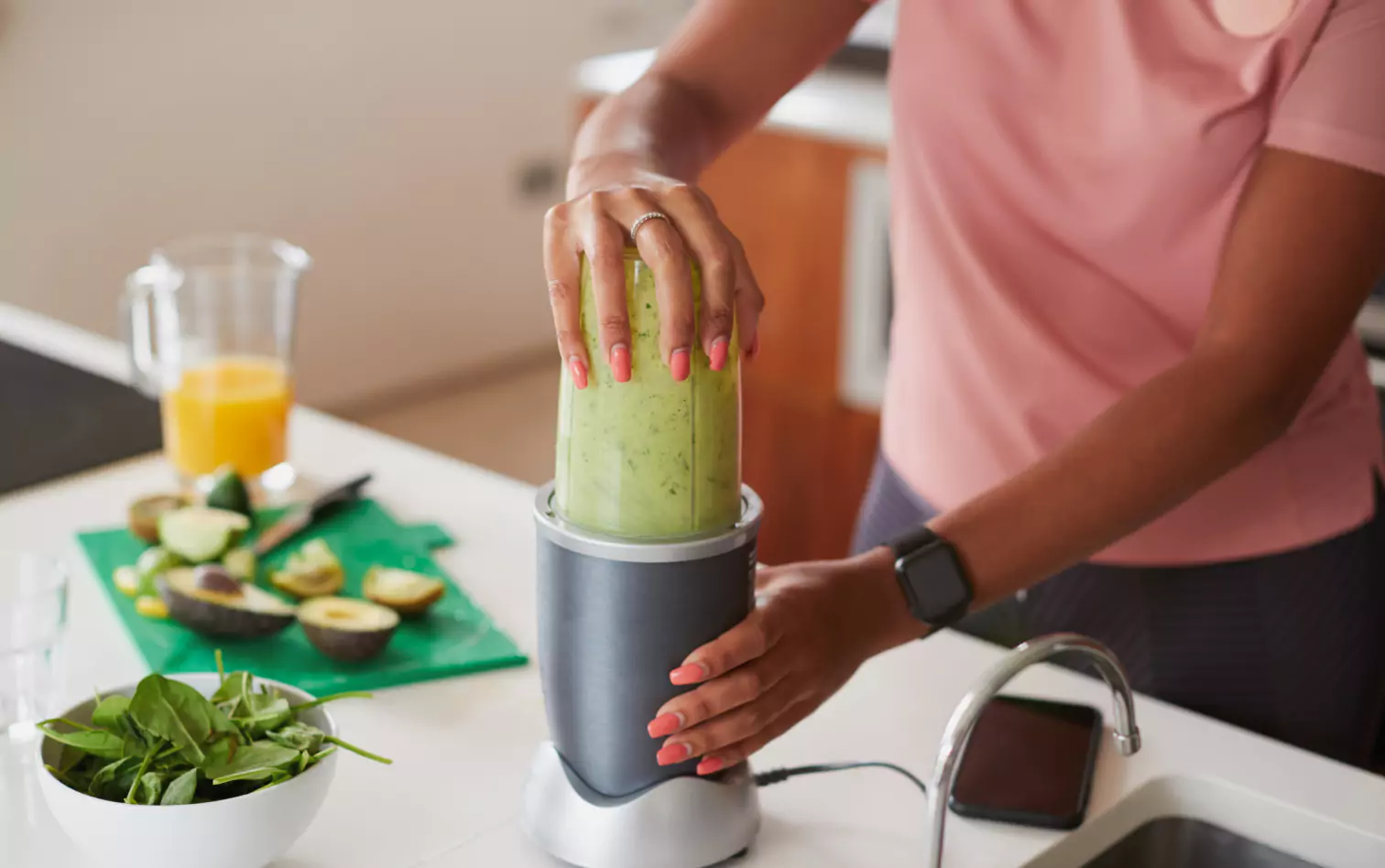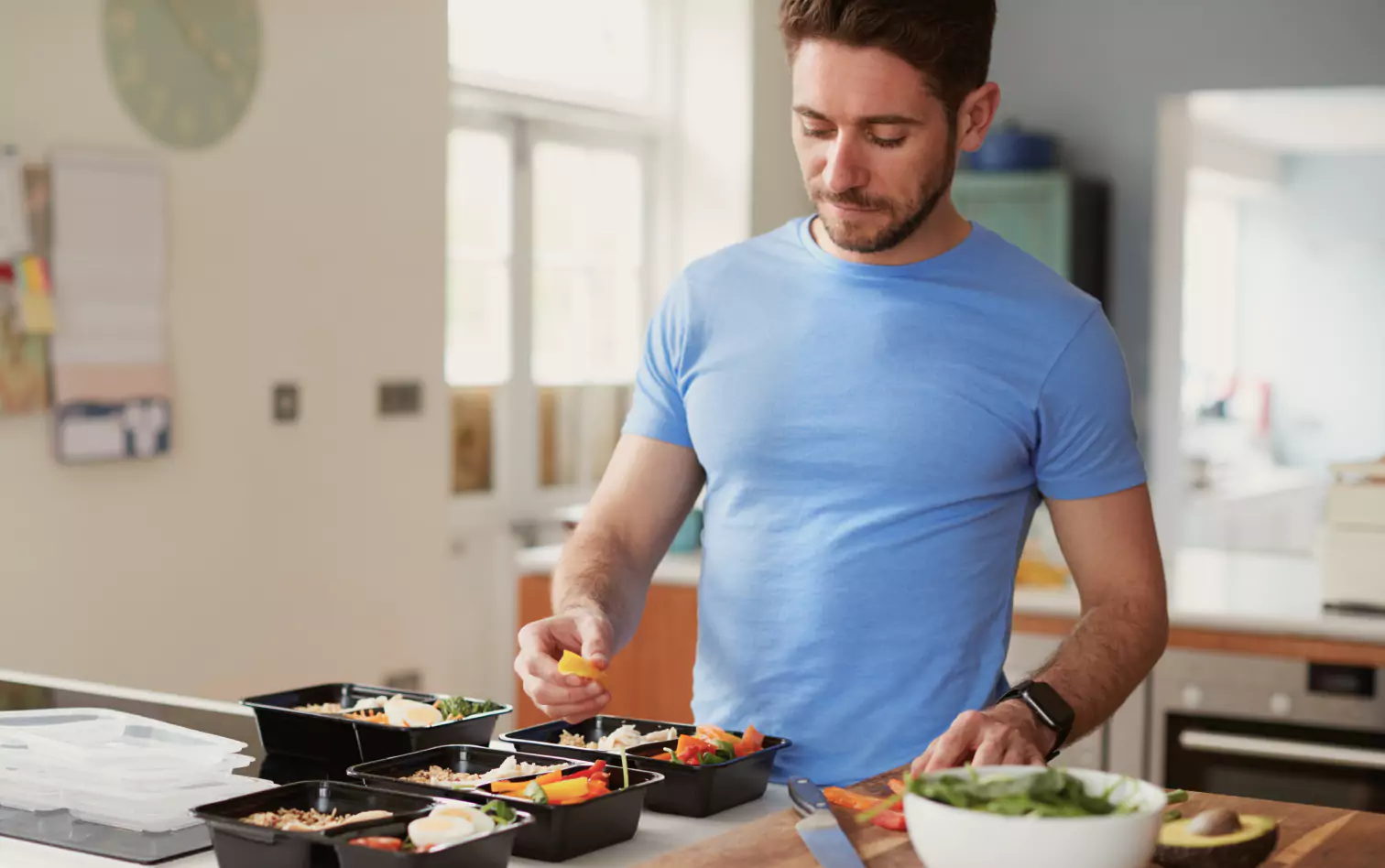Eating Before and After Your Workout

Key Takeaways
Whether you’re trying to build muscle, lose weight or maintain overall wellness, weaving a workout into your daily routine is pretty important. There’s no shortage of research on the health benefits of physical activity.
The World Health Organization recommends adults get at least five hours of moderate-intensity aerobic activity a week. So if you’re not already, it’s time to get moving! But as you plan your daily exercise routine, don’t forget to work on planning your pre and post-workout meals too.
Pre-workout nutrition helps make that training session worth it since it fuels your body during your workout. And post-workout nutrition is essential because it helps you recover and rehydrate afterward! If you don’t give your body the proper nutrients at the right time, then you may see a decrease in performance and an increase in muscle soreness.
If you find yourself wondering what and when to eat before and after your daily workout, you’re asking the right questions. The answers, of course, will depend on your body type, weight, fitness goals, fitness regime, age, and pre-existing conditions. And while there’s no one-size-fits-all, here are some tips for healthy, efficient eating around your workouts to help you get started.
Timing Your Pre and Post-Workout Meals

Should you eat one or three hours before your workout? Is a heavy meal a good idea immediately after an intense workout? How long is too long to wait for your post-workout snacks? Timing may not be everything, but it’s definitely important when it comes to your workout.
Timing your meals around your workouts may affect your performance when you exercise. The nutrients you eat provide you with energy to push yourself while you work out and recover after. Still, there’s no one-size-fits-all when it comes to nutrition, so everything from what your body needs to fuel it to what it needs in recovery will depend on your responses to food.
So, what’s most important is to pay attention to the foods you eat before and after your workout because they may directly affect how you feel and how quickly you recover. If you’re having trouble figuring out what you should eat and when you should be eating it, work with a dietitian or nutritionist to form a meal plan that’s best for you.
Before Your Workout

How soon before a workout should you be snacking? What sort of pre-exercise nutrient intake is the right choice for you? When and what you eat may depend on when you exercise and the duration and intensity of your workout. Here is a general guide to eating before your workout at various times of the day:
Early morning
- If you’re a go-getter in the mornings and like to sweat it out before starting your day, you could eat a small snack approximately 30 minutes before you begin your workout. Some fasted workouts are okay, but if you feel like you’re having trouble getting through it, adding some fuel beforehand can be helpful.
- Make sure to drink water when you wake up too. Hydration is one of the most important ways to care for your body when you exercise.
- If you plan to exercise for over an hour in the morning, make sure to include some carbohydrates and protein into your small meal so that your body has enough fuel to burn.
- Try to finish your breakfast about an hour before your workout if you plan an intense workout to allow time for digestion.
Mid-day
- If you plan to get a workout in during lunchtime, hydrate all morning. Try to finish your meal approximately two hours before your workout.
- Try eating a nutrient-packed breakfast on these days to have remaining fuel in your system for your workout.
Evening
- Try to stop eating approximately two hours before you begin your workout.
- Incorporate protein, fiber, and carbohydrates into your lunch to give your body the fuel it needs by the time you hit the gym.
- Hydrate throughout the day to aid digestion and provide your body with the water it will be sweating out.
What to Eat

Exactly what you should eat will depend on how your body responds to different foods. For example, while some pre-workout meals that include sweet potato and whole-grain bread with veggies will work well for some people, others may require a few extra grams of protein.
Some people may have good responses with low-fat milk, while others may need whole milk. So, it’s best to work with a registered dietitian or nutritionist to figure out what’s best for you. But if you’re looking for a few ideas to help kickstart your pre-workout meal planning, here are a few ideas from our favorites:
- Try a smoothie for a pre-workout snack that’s delicious and filling. Try a banana or a mix of fruits your body responds best to.
- Whole fruits are always a good option! Pair some energy-boosting fruit like apples, pears, and oranges with nut butter for the best pre-workout snack. We’re partial to almond butter!
- If you’re looking for more of a pre-workout meal than a snack, foods like brown rice paired with a protein (chicken is a go-to for us) work well for some people.
- Granola, Greek yogurt, and berries packed with amino acids for a higher-carb pre-workout snack.
- If cottage cheese suits you, consider swapping Greek yogurt for this for a lower carb protein-rich option with your berries. It may help with metabolism and overall health, even if you consume it just as a late-night snack!
- If you respond well to oats, consider a pre-workout bowl of oatmeal with some berries. They’re a fiber-filled option that can help convert carbohydrates to energy and are a helpful pre-workout snack for some.
After Your Workout

To aid muscle recovery, try to eat within two hours of your workout. Wondering why? When you work out, the glycogen that your muscles store gets depleted. So, it’s a good idea to have high-quality, nutritional post-workout snacks to help stimulate post-exercise muscle protein synthesis.
If you eat several hours after your workout, or you’ve had a particularly intense workout, consider a protein-rich snack like a smoothie, a whey shake, hard-boiled eggs with fruit or fruit, and organic Greek yogurt.
Make sure that you are hydrating after your workout too. Water intake is just as important as the foods that you eat. Drinking plenty of water will help to prevent dehydration during your post-workout recovery.
What to Eat

Here too, picking a specific type of food will depend on your body. Your post-workout meal may include chocolate milk, while others may stick with Greek yogurt and fruit. Some post-workout nutrition guidelines may suggest a protein powder-filled shake. And while it can help some people to build muscle and recover quicker after a workout, others may not respond that well to such a high protein diet.
The same goes for things like carbohydrates and fats. If you don’t know what works for you, consider using a continuous glucose monitor to track your responses so you can see what works best for your body. And once you figure that out, you can pick from some of our favorite post-workout snacks!
- Whole grains often work well as a post-workout meal—our favorite options are tortillas filled with lean protein.
- Looking for some electrolyte replacement after your workout? Consider rehydrating with natural sources like kale, coconut water, oranges, and sweet potatoes.
- Chia seeds also contain electrolytes, and a chia seed pudding can be a pretty delicious way to get some of that post-workout nutrition you need. Consider adding it into a smoothie or your oatmeal.
- Don’t shy away from fats. Consider avocados or nut butter on whole-grain pita.
- Protein post-workout can help build muscle tissue. Make yourself a delicious scramble, or try some grilled salmon on toast.
Different Workouts Require Different Recovery Food

We’ve told you about some of our favorite pre and post-workout snacks, but the list is far from extensive. There are so many different types of workouts, which means that there are many ways to fuel up after them. The focus of this recovery should be your carbohydrate and protein intake, but make sure that you are also getting your fiber and nutrients in.
Cardiovascular Exercise
For some people, it’s a good idea to fuel longer endurance cardiovascular activities such as swimming, cycling, long-distance running, and climbing with a carbohydrate-rich diet supplemented with protein. Try to balance your meals by consuming around 4 grams of carbohydrates per 1 gram of protein in your meals. For others, a higher fat diet with moderate protein is a good option after cardiovascular exercises.
Strength Training
If you’re working to build muscle and gain strength, you should focus on eating more protein in every meal. The Cleveland Clinic recommends balancing 2 grams of carbohydrates per 1 gram of protein.
Mixed Activity
Your carbohydrate to protein ratio will vary depending on how you balance your exercise, but adding 3 grams of carbs per 1 gram of protein in every meal is an excellent place to start.
Listen to Your Body

Everyone’s body has different nutritional needs and reactions to foods. The intensity and duration of your workouts will determine how much you should eat and drink, but what foods work best for your body may not be the same as others. Pay attention to how you feel when you work out and how you feel as you recover after eating different foods.
An easy way to monitor the foods that work for you is to use nutrition journals, food tracking apps, and CGMs. These tools will enable you to keep track of the foods that your body reacts to best while you sweat it out on your way to meeting your fitness goals.
Develop a Healthy Relationship with Food

Many people refer to working out as a way to eliminate the calories they’ve consumed and focus solely on weight loss and gains. It can quickly turn into unhealthy mentalities surrounding food. Try looking at food as fuel for your body to use as it becomes stronger and healthier.
If you like to cook, this can be a fun time to develop delicious and healthy recipes to provide to your body. If you aren’t kitchen savvy, try using a meal service like Sunbasket, Sakara, or Hungryroot.
And if you are someone who is always on the go and doesn’t have time to spend preparing meals, make sure to keep healthy snacks around like nuts, fruits, lean meats, protein shakes, and smoothie mixes.
It’s also always a good idea to speak with a registered dietitian to learn more about planning your meals with your goals in mind. Working with a professional will help you understand enough about your body to begin intuitively making decisions about what you put into it—workout or no workout!
Find the right Nutrisense programto turn insight into progress.
Go Beyond Glucose Data with Nutrisense
Your glucose can significantly impact how your body feels and functions. That’s why stable levels are an important factor in supporting overall wellbeing. But viewing glucose isn't enough. Nutrisense, you’ll be able to learn how to use your body's data to make informed lifestyle choices that support healthy living.
One-to-one coaching
Sign up to access insurance-covered video calls to work with a glucose expert: a personal registered dietitian or certified nutritionist who will help tailor your lifestyle and diet to your goals.
Monitor and measure what matters
With the Nutrisense CGM Program, you can monitor your glucose with health tech like glucose biosensors and continuous glucose monitor (CGM)s, and analyze the trends over time with the Nutrisense App. This will help you make the most informed choices about the foods you consume and their impact on your health.
Find your best fit
Ready to take the first step? Start with our quiz to find the right Nutrisense program to help you take control.

Amanda is a Nutrition Manager and Registered Dietitian, with a Masters in Dietetics from Stephen F. Austin State University. Originally from south GA, she got her undergrad degree from Texas Tech University. She worked at a hospital in Fort Worth, TX, for 4 years as a dietitian, counseling those living with HIV.

.webp)


